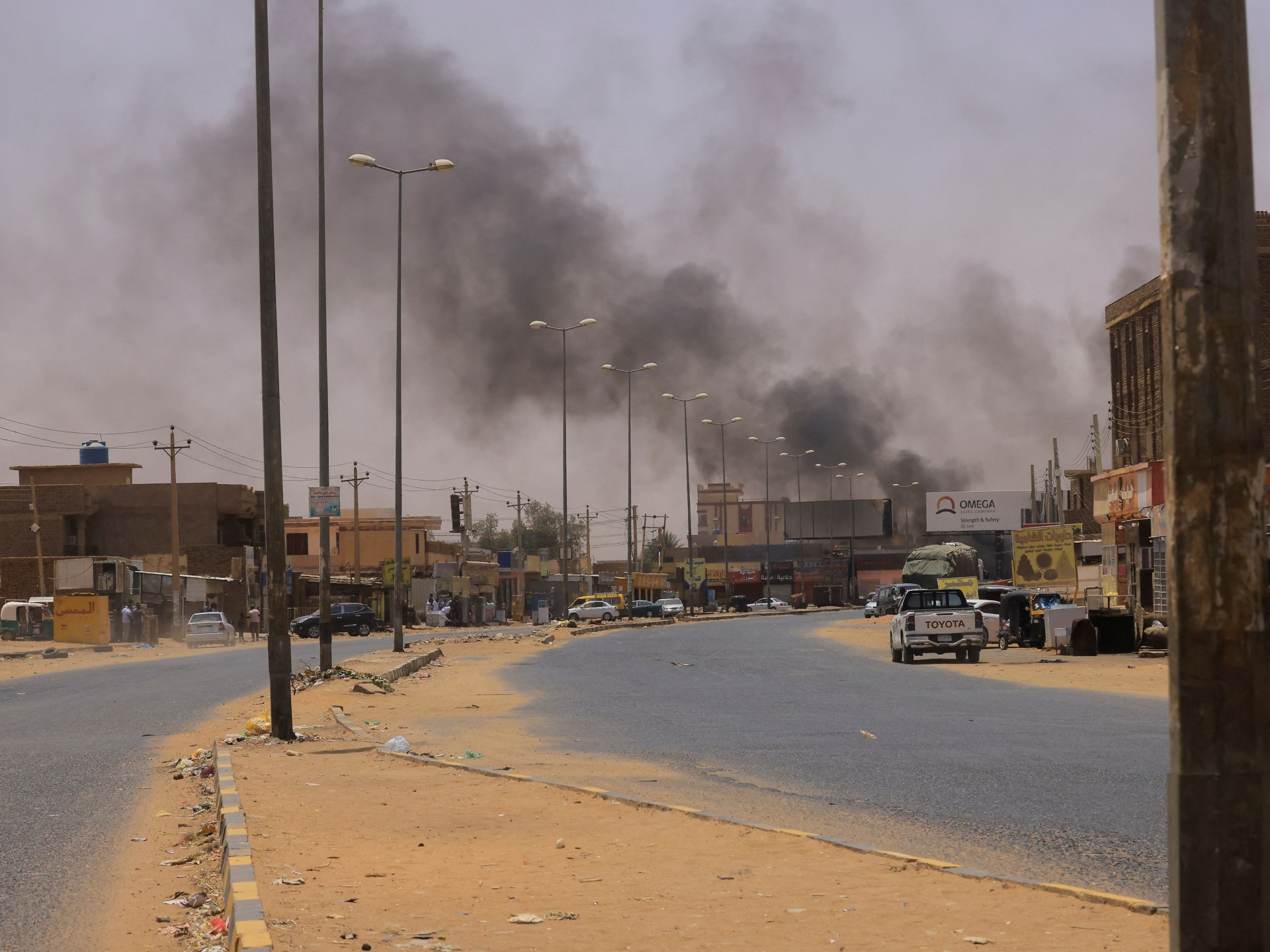Smoke rising from buildings near the Halfaya Bridge in Omdurman as a result of battles between the Sudanese army and the Rapid Support Forces (Reuters)
The Sudanese Al-Ahdath newspaper, citing sources in the Sudanese army, said that the International Red Cross had begun negotiations with the Rapid Support Forces, which have occupied the radio and television building in Omdurman since the beginning of the war on April 15, with the aim of surrendering through a negotiation process due to the siege imposed on it for more than A month ago.
A source in the army confirmed to the newspaper that they agreed to the Red Cross’s invitation to negotiate due to the presence of prisoners on radio and television, and added that, at the request of the Red Cross, they postponed the storming that was planned last week. The source confirmed to the newspaper that they refused the Rapid Support fighters to leave with their weapons.
Units of the armed forces and teams of special action forces, which were stationed 500 meters away from the television on the southern side, had tightened their siege on the radio and television buildings, cutting off supplies to the Rapid Support Forces inside the building.
Eyewitnesses confirmed that the Rapid Support Forces released some of their prisoners from inside radio and television. The newspaper also reported that another group occupying the house of the late Umma Party leader, Sadiq al-Mahdi, which is close to the radio and television buildings, has also expressed its desire to surrender, but the Red Cross has not reached an agreement with them yet. The newspaper said that it contacted the Red Cross regarding this issue, but did not receive a response from it.
The Foreign Ministry condemns the cutting of communications
On the other hand, the Sudanese Ministry of Foreign Affairs said that what it called the Rapid Support militia had cut off telephone communications and the Internet in large parts of the country in the past few days.
The statement issued yesterday, Monday, added, "This crime has catastrophic effects on the economic and humanitarian conditions, and will exacerbate the ongoing suffering of civilians."
The statement indicated that cutting off communications and Internet services means stopping bank transfers and digital financial services, which have become the lifeline for a large segment of citizens in light of the cessation of many economic activities and means of making a living. It added that it hinders the flow of humanitarian services, including treatment, aid, and efforts to rescue the stranded, as well as It was impossible to communicate between the Sudanese inside and outside the country and between the different states.
The statement considered that what it called "the criminal behavior of the militia" provides "new evidence that it is implementing a complete plan under the supervision of its external sponsors to destroy the infrastructure and components of the state in Sudan, and in its implementation it seeks the assistance of foreign mercenaries," according to its description.
The statement indicated that the Rapid Support Forces had previously seized the main centers of telecommunications companies, and accused them of "looting and sabotaging a large number of branches and equipment of telecommunications companies, especially in the states of Darfur, which caused long-term damage to the networks there."
The Ministry of Foreign Affairs called on the international community, international, regional and humanitarian organizations, and the governments of countries interested in achieving peace in Sudan to condemn “this barbaric crime,” according to the statement.
Cut off from the world
An expert and former official in the Sudanese Communications Authority had told Al Jazeera that the Rapid Support Forces had already ordered the Sudanese and MTN Communications companies to cut off communication and Internet services for 36 million subscribers in the country, because Sudatel was unable to maintain the fiber network cable. Light traffic in Darfur due to the war, which led to a number of Darfur states being cut off from telecommunications and Internet service.
The former official in the Communications Authority - who preferred to withhold his name - confirmed that the Rapid Support Forces control the areas where the main servers of the two companies are located, and warned that the problem goes beyond the interruption of communications and the Internet to affect banking applications, and closing the main servers randomly or sabotaging them makes it difficult to operate. Restarting may cause Sudan to be completely cut off from the world for a long period.
Workers in telecommunications companies in Sudan told Al Jazeera that telecommunications and Internet services face security and logistical problems that caused the suspension of two of the main telecommunications companies in the country, in addition to the exit of entire states from coverage.
The former official expected that the Kuwaiti company "Zain" (the largest operator in Sudan) would join the "Sudani" and "MTN" South African companies, which represents a dangerous development in the course of the war and a clear violation of human rights, he said.
Sudanese human rights organizations and activists expressed their concern that the ongoing internet outage, for the third day in a row, would affect the humanitarian situation in the country and create conditions for committing new crimes.
Since mid-April 2023, the Sudanese army, led by the President of the Sovereignty Council, Abdel Fattah al-Burhan, and the Rapid Support Forces, led by Mohamed Hamdan Dagalo (Hemedti) - who was Vice-President of the Sovereignty Council before the outbreak of the conflict - have been waging a war that has left more than 13,000 dead and more than 7 million displaced. A refugee, according to the United Nations.
Source: Al Jazeera + Sudanese press

